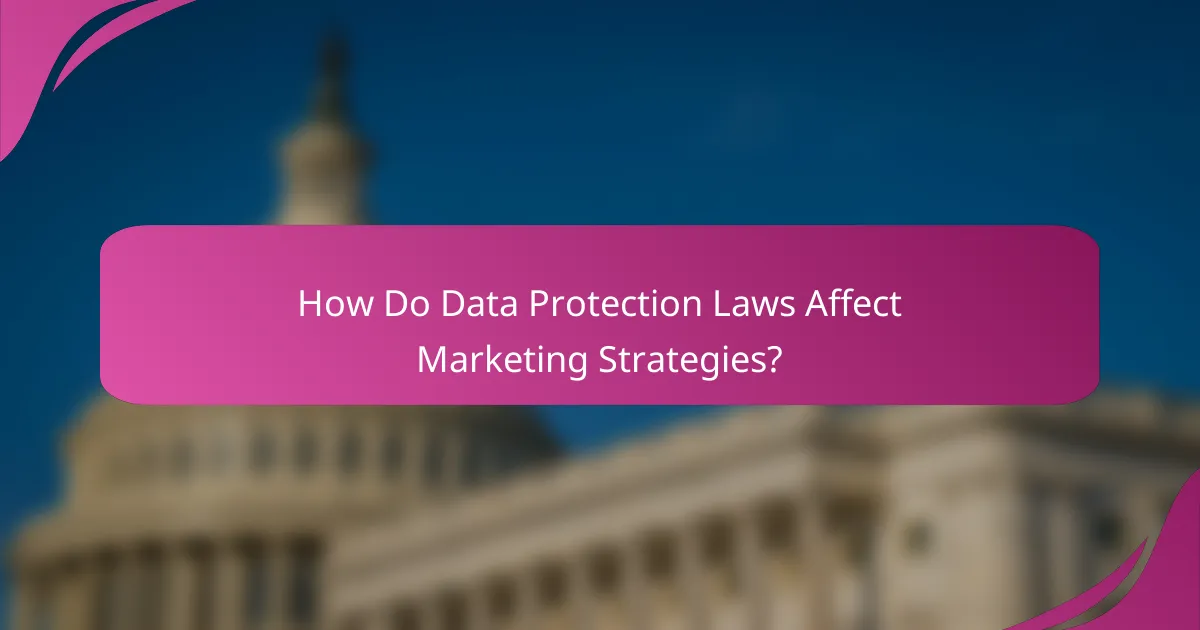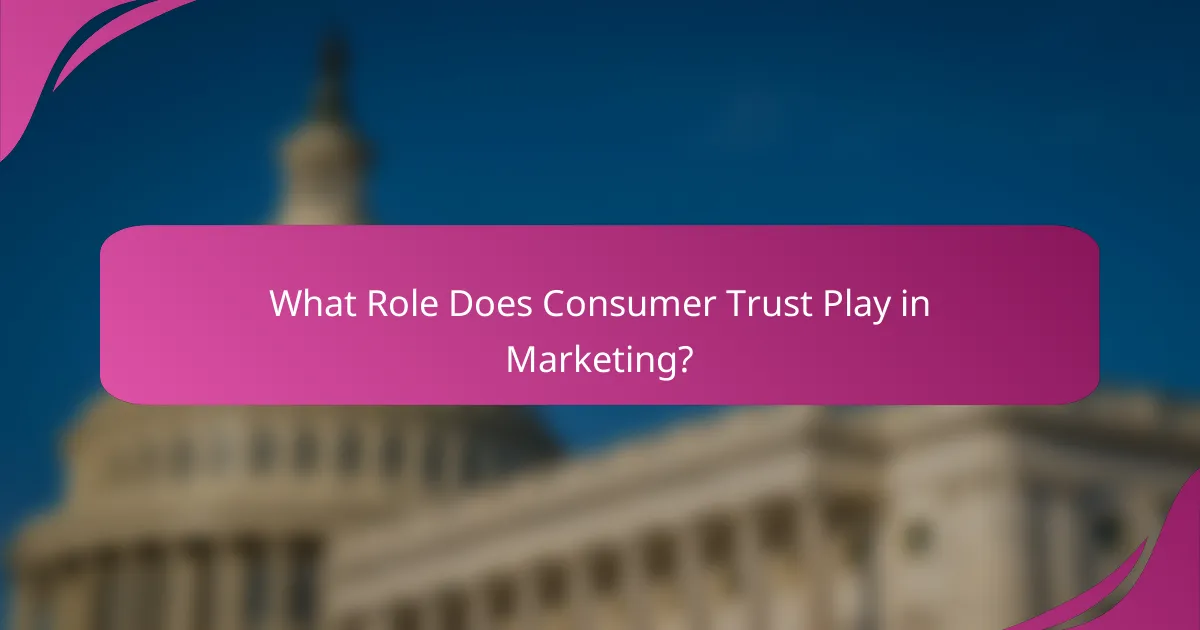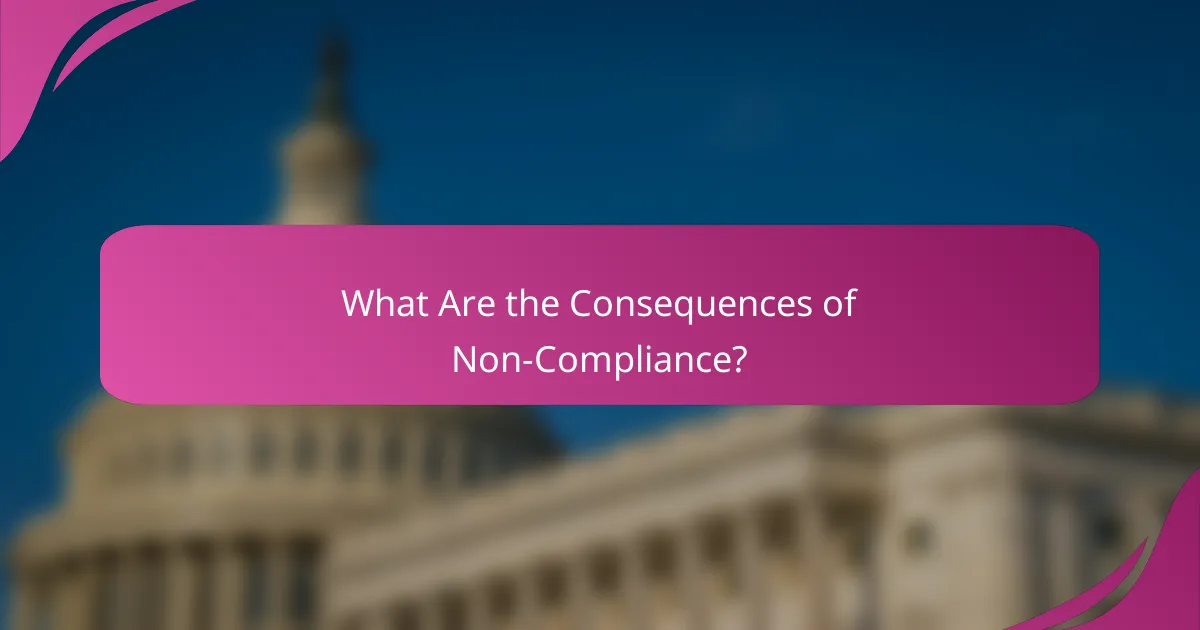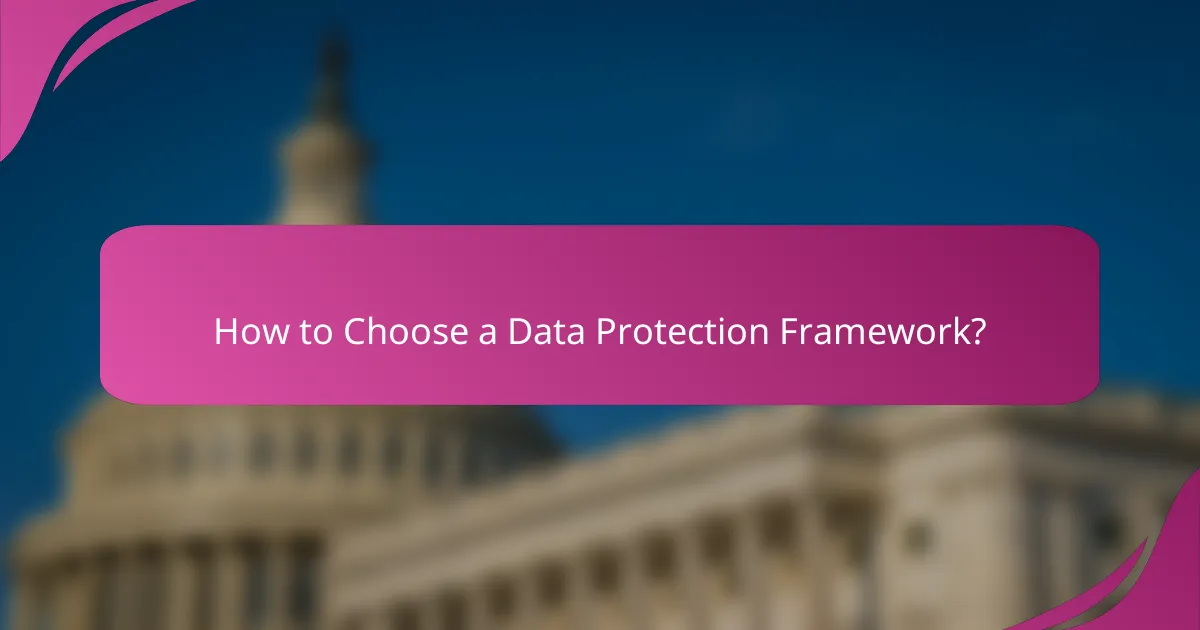Data protection laws play a crucial role in shaping marketing strategies by regulating the collection, storage, and use of consumer data. Compliance with these laws is vital not only for avoiding legal repercussions but also for fostering consumer trust in an increasingly privacy-conscious market.

How Do Data Protection Laws Affect Marketing Strategies?
Data protection laws significantly influence marketing strategies by imposing regulations on how businesses collect, store, and use consumer data. Compliance with these laws is essential for maintaining consumer trust and avoiding legal penalties.
Impact on targeted advertising
Data protection laws restrict the use of personal data for targeted advertising, requiring businesses to obtain explicit consent from consumers. This means marketers must be transparent about data usage and may need to adjust their targeting criteria to comply with regulations.
As a result, companies may rely more on contextual advertising rather than behavioral targeting, which can lead to broader audience reach but potentially lower conversion rates.
Changes in consumer data collection
With stringent data protection laws, businesses must revise their data collection practices to ensure compliance. This often involves implementing clear consent mechanisms and providing consumers with easy access to their data.
Marketers should focus on collecting only essential data, which not only helps in compliance but also builds trust with consumers who are increasingly concerned about privacy.
Influence on content personalization
Content personalization is affected as marketers must balance customization with privacy concerns. While personalized experiences can enhance engagement, they require careful handling of consumer data to avoid breaches of trust.
Marketers can utilize aggregated data or anonymized insights to create relevant content without infringing on individual privacy, thus adhering to legal standards while still delivering value.
Effects on email marketing
Email marketing strategies must adapt to data protection laws by ensuring that recipients have opted in to receive communications. This involves maintaining clear records of consent and providing easy opt-out options.
Marketers should segment their email lists based on consent preferences and engagement levels to enhance effectiveness while remaining compliant with regulations.
Consequences for social media campaigns
Social media campaigns face challenges as data protection laws limit how businesses can utilize user data for targeted advertising. Marketers must ensure that any data used for social media ads is collected with proper consent.
To navigate these challenges, brands can focus on organic engagement and community-building strategies, which do not rely heavily on personal data and can foster a loyal customer base.

What Are Key Data Protection Laws in the US?
Key data protection laws in the US focus on safeguarding consumer privacy and regulating how businesses handle personal information. These laws vary by sector and state, with significant implications for marketing practices and compliance requirements.
California Consumer Privacy Act (CCPA)
The California Consumer Privacy Act (CCPA) grants California residents specific rights regarding their personal data. It requires businesses to disclose what personal information they collect, how it is used, and with whom it is shared.
Under the CCPA, consumers can request the deletion of their data and opt out of the sale of their personal information. Businesses must comply with these requests, or they risk facing substantial fines, which can reach up to $7,500 per violation.
Health Insurance Portability and Accountability Act (HIPAA)
The Health Insurance Portability and Accountability Act (HIPAA) establishes standards for protecting sensitive patient information in the healthcare sector. It applies to healthcare providers, insurers, and any business associates that handle protected health information (PHI).
HIPAA mandates that covered entities implement safeguards to ensure the confidentiality, integrity, and availability of PHI. Non-compliance can lead to severe penalties, including fines that can exceed millions of dollars, depending on the severity of the violation.
Children’s Online Privacy Protection Act (COPPA)
The Children’s Online Privacy Protection Act (COPPA) is designed to protect the privacy of children under the age of 13 online. It requires websites and online services directed at children to obtain verifiable parental consent before collecting personal information.
Businesses must provide clear privacy policies detailing their data practices and allow parents to review and delete their child’s information. Failure to comply with COPPA can result in fines of up to $43,280 per violation, emphasizing the importance of strict adherence to these regulations.

How Can Businesses Ensure Compliance?
Businesses can ensure compliance with data protection laws by implementing robust policies, conducting regular audits, and training employees effectively. These steps help maintain consumer trust while minimizing legal risks.
Implementing data protection policies
Establishing clear data protection policies is crucial for compliance. These policies should outline how personal data is collected, processed, stored, and shared. Businesses should tailor their policies to align with relevant regulations, such as the GDPR in Europe or CCPA in California.
Consider including specific guidelines on data access, retention periods, and breach notification procedures. Regularly reviewing and updating these policies ensures they remain effective and compliant with evolving laws.
Conducting regular audits
Regular audits are essential for assessing compliance with data protection laws. These audits should evaluate data handling practices, identify potential vulnerabilities, and ensure adherence to established policies. Aim to conduct audits at least annually or whenever significant changes occur in data processing activities.
Utilizing third-party auditors can provide an objective perspective and help identify areas for improvement. Documenting audit findings and corrective actions taken is vital for demonstrating compliance during regulatory inspections.
Training employees on compliance
Training employees on data protection compliance is fundamental to safeguarding personal information. All staff should understand their roles in data handling and the importance of adhering to established policies. Regular training sessions can reinforce these concepts and keep employees informed about new regulations.
Consider implementing a mix of training methods, including workshops, online courses, and quizzes. Providing real-life scenarios can enhance understanding and retention. Ensure that employees are aware of the consequences of non-compliance to foster a culture of accountability.

What Role Does Consumer Trust Play in Marketing?
Consumer trust is essential in marketing as it influences purchasing decisions and brand perception. When customers believe a brand is reliable and values their privacy, they are more likely to engage and remain loyal.
Importance of transparency
Transparency in marketing fosters consumer trust by ensuring that customers understand how their data is collected and used. Brands that openly communicate their data practices are more likely to gain consumer confidence.
To enhance transparency, companies should provide clear privacy policies and easily accessible information about data handling. Regular updates and straightforward language can help demystify complex legal jargon.
Building trust through data security
Implementing robust data security measures is crucial for building consumer trust. Customers are more willing to share personal information with brands that demonstrate a commitment to protecting their data.
Brands can enhance data security by adopting industry standards such as encryption and regular security audits. Additionally, obtaining certifications like ISO 27001 can signal to consumers that their data is in safe hands.
Impact of trust on brand loyalty
Trust significantly impacts brand loyalty, as consumers are more likely to return to brands they trust. When customers feel secure in their interactions, they tend to make repeat purchases and recommend the brand to others.
To cultivate brand loyalty, businesses should prioritize customer feedback and address concerns promptly. Engaging with customers through personalized communication can further strengthen their loyalty and trust in the brand.

What Are the Consequences of Non-Compliance?
Non-compliance with data protection laws can lead to severe repercussions for businesses, including financial penalties, damage to reputation, and a decline in customer trust. Understanding these consequences is crucial for maintaining compliance and safeguarding your organization.
Legal penalties and fines
Legal penalties for non-compliance can vary significantly depending on the jurisdiction and the severity of the violation. In the European Union, for instance, fines under the General Data Protection Regulation (GDPR) can reach up to 4% of a company’s annual global turnover or €20 million, whichever is higher. In the United States, penalties can differ by state and law, with some states imposing fines that can range from thousands to millions of dollars.
To avoid these financial burdens, businesses should implement robust compliance programs that include regular audits and employee training. Staying informed about local regulations and their updates is essential to mitigate risks.
Reputational damage
Reputational damage from non-compliance can be long-lasting and difficult to repair. Customers may associate a company’s failure to protect data with a lack of professionalism and reliability. This negative perception can lead to decreased sales and customer loyalty.
To protect your brand, it is vital to communicate transparently with customers about data practices and compliance efforts. Proactively addressing any breaches and demonstrating commitment to data protection can help rebuild trust and mitigate reputational harm.
Loss of customer trust
Non-compliance can lead to a significant loss of customer trust, which is often hard to regain. When customers feel their personal data is not secure, they may choose to take their business elsewhere. Surveys indicate that a substantial percentage of consumers are willing to switch brands if they perceive a lack of data protection.
To maintain customer trust, businesses should prioritize transparency in their data handling practices and ensure that they are compliant with relevant laws. Regularly updating customers on privacy policies and security measures can reinforce their confidence in your organization.

How to Choose a Data Protection Framework?
Selecting a data protection framework involves understanding your organization’s specific needs, regulatory requirements, and the types of data you handle. A well-chosen framework not only ensures compliance but also enhances consumer trust and marketing effectiveness.
Identify Your Data Protection Needs
Begin by assessing the types of data your organization collects and processes. This includes personal information, payment details, and any sensitive data that may require additional protection. Understanding your data landscape helps in selecting a framework that aligns with your operational requirements.
Consider the scale of your operations and the potential risks associated with data breaches. For instance, small businesses may opt for simpler frameworks, while larger enterprises might need comprehensive solutions that address complex regulatory landscapes.
Evaluate Regulatory Requirements
Different regions have varying data protection laws, such as the GDPR in Europe or CCPA in California. Familiarize yourself with the regulations applicable to your business to ensure compliance. This step is crucial as non-compliance can lead to significant fines and reputational damage.
When evaluating frameworks, check if they align with the specific legal obligations in your jurisdiction. For example, if you operate in the EU, a framework that supports GDPR compliance will be essential.
Consider Integration and Scalability
Your chosen data protection framework should seamlessly integrate with existing systems and processes. Look for solutions that offer compatibility with your current technology stack to minimize disruption during implementation.
Scalability is also vital; as your business grows, your data protection needs may evolve. Opt for frameworks that can adapt to increasing data volumes and changing regulatory landscapes without requiring a complete overhaul.
Assess Costs and Resources
Cost is a significant factor when selecting a data protection framework. Evaluate both initial implementation costs and ongoing maintenance expenses. Some frameworks may require substantial upfront investment, while others might offer more affordable subscription models.
Additionally, consider the resources required for training staff and managing compliance. A framework that is user-friendly and requires minimal training can save time and reduce operational burdens.
Test and Review
Once a framework is implemented, conduct regular audits and reviews to ensure it remains effective and compliant. Testing your data protection measures helps identify vulnerabilities and areas for improvement.
Establish a schedule for periodic assessments and stay updated on changes in regulations that may impact your framework. This proactive approach will help maintain consumer trust and protect your organization from potential risks.
